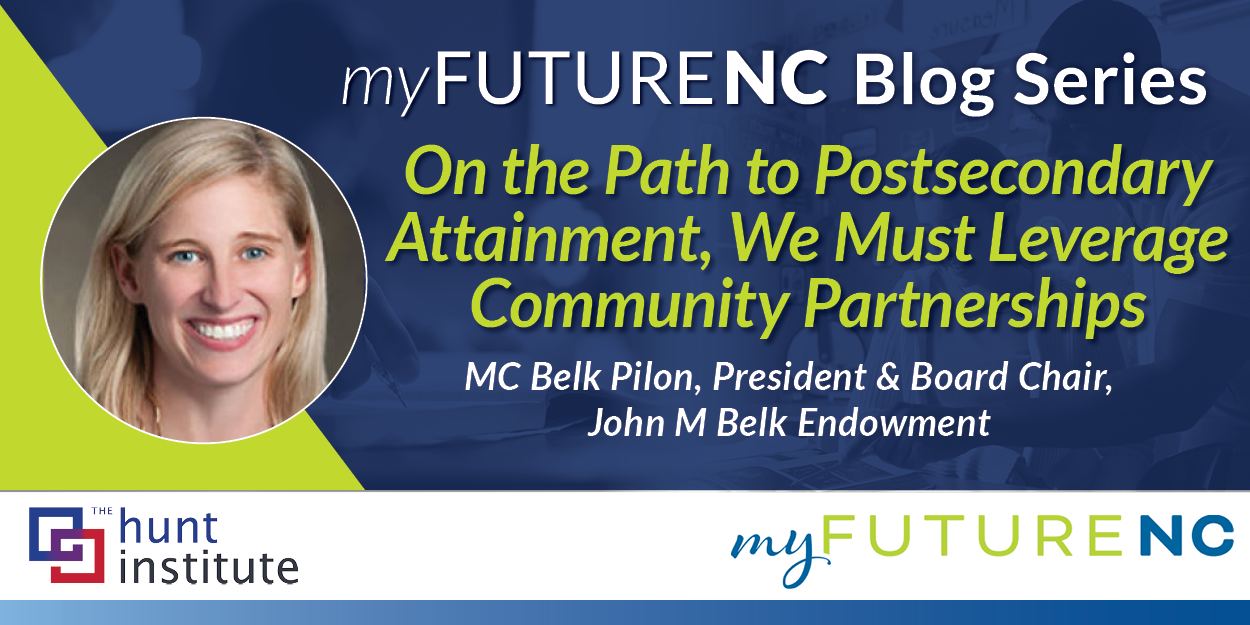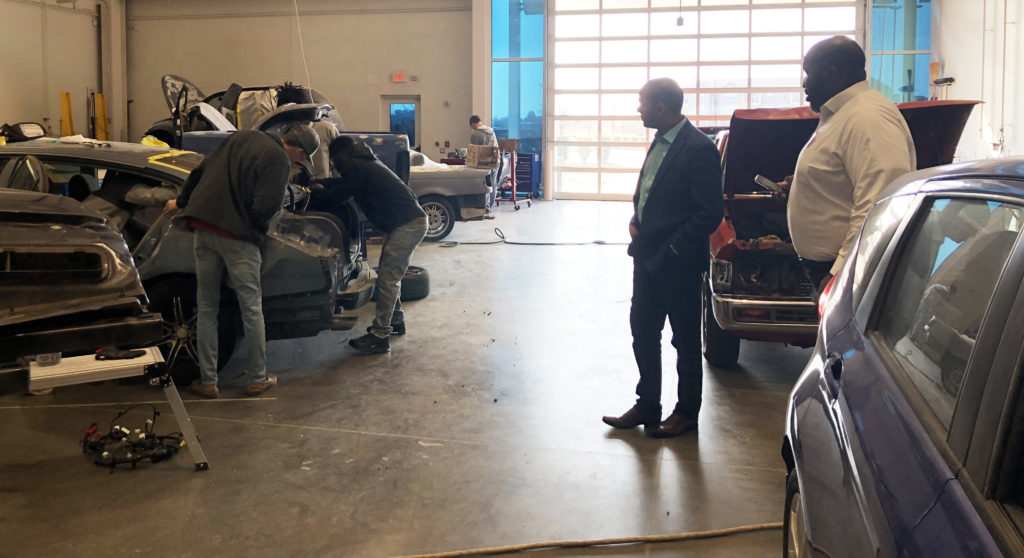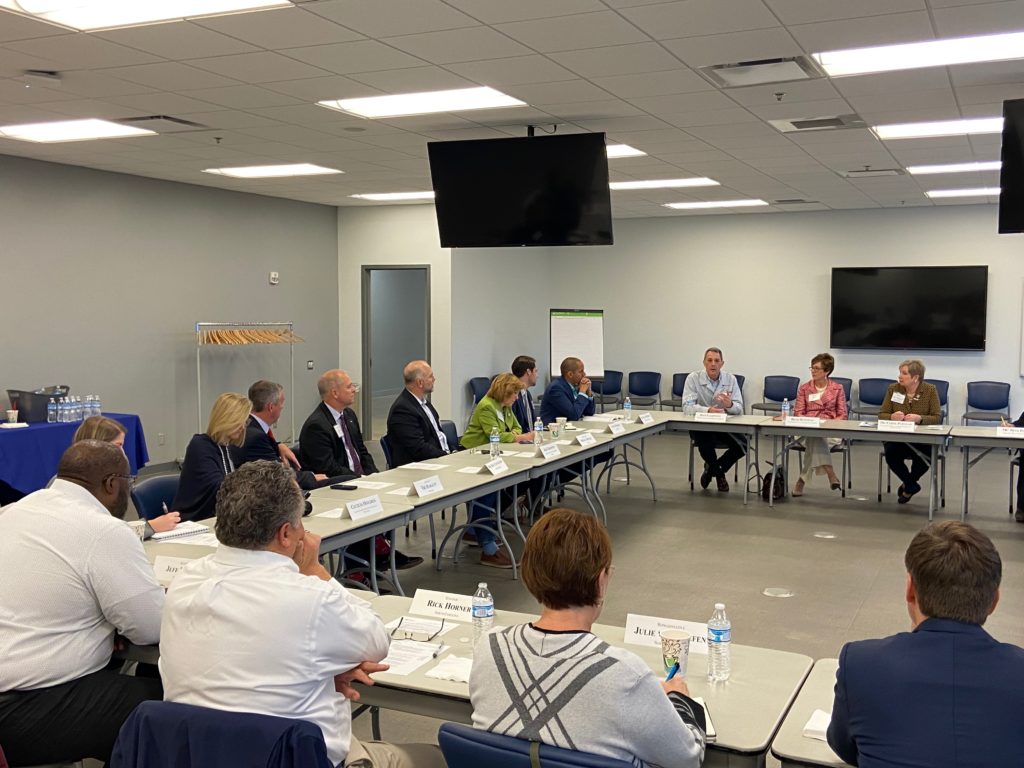

January 8, 2020

By: MC Belk Pilon, President and Board Chair, John M Belk Endowment and member of the myFutureNC Board of Directors
Editor’s Note: The Hunt Institute works to provide policymakers from around the country with the opportunity to experience innovative models of education first-hand. During a recent visit to Tennessee highlighting the state’s postsecondary attainment efforts, policymakers and state leaders were able to learn about ways in which public-private partnerships can support the unique attainment needs of a community.
The establishment of the myFutureNC postsecondary attainment goal was a highly collaborative effort that benefited from contributions from stakeholders across the state as well as partners in other states. Tennessee, a recognized leader in postsecondary education reform, established the Drive to 55 initiative in 2014, which aims to increase the number of individuals with a postsecondary degree or certificate to 55 percent by 2025 (from 33.8 percent in 2015).
Tennessee knew it had a lot of work to do and has implemented a number of new policies and programs to help the state make progress. I was thankful for the opportunity to join policymakers in Tennessee to hear from Mike Krause, Executive Director of the Tennessee Higher Education Commission, and to visit an amazing partnership between the Tennessee College of Applied Technology – Murfreesboro and Nissan USA.
Our visit to Tennessee began with a presentation by Mike Krause, which highlighted the history of the state’s postsecondary attainment effort, including its postsecondary governance reforms, its changes to postsecondary funding, and some of the key programs the state created to increase postsecondary access.
One of the key initiatives created to support postsecondary attainment is Tennessee Promise. The program offers high school graduates the opportunity to attend any in-state community college tuition-free after receiving all eligible federal student aid (e.g., Pell Grants). This program has increased the number of students enrolling in community colleges by about 1,000 students per year since it began in 2015.
In an effort to provide similar opportunities to adult learners, the Tennessee Reconnect grant was launched in 2018 to help adult learners enroll in community colleges. The grant provides funds to independent students who do not have an associate or bachelor’s degree and allows them to use the funds at any community college in the state.
In addition to Tennessee Promise and Tennessee Reconnect, a number of programs have been created to provide academic support and mentoring to students. In North Carolina, we know that access alone will not be sufficient to ensure we meet our attainment goal, and it was helpful to learn more about Tennessee’s approach to mentorship and career coaching.
We also know that collaboration with business will be critical in North Carolina and, on our second day in Tennessee, we had the opportunity to visit the Smyrna Campus of the Tennessee College of Applied Technology (TCAT) – Murfreesboro. Funded with both public dollars appropriated by the legislature and private dollars from Nissan, this campus was created in 2017 to address Nissan’s needs for skilled workers at its Rutherford County plant. As Dan Caldwell, Nissan’s Senior Manager of Learning Pathways, explained “Nissan had a need for skilled workers, and going to high school graduations to recruit was too late because the talent we needed had already accepted positions elsewhere.”

The Hunt Institute’s President & CEO, Dr. Javaid Siddiqi, and Minnesota State Senator Jeff Hayden tour TCAT-Murfreesboro.
During a tour of the campus, led by Dan Caldwell and Dr. Carol Puryear, Vice Chancellor for Economic and Community Development for the Tennessee Board of Regents and Interim President of TCAT Murfreesboro, we were able to see ways in which this shared facility truly serves the needs of both the public and private sectors. By providing spaces for both community college courses for students and professional development for Nissan employees, everyone attending TCAT/Nissan has access to state-of-the-art equipment and facilities. As we visited the classrooms and learning spaces, it was incredible to see the access the students have to hands-on learning.
In the panel discussion that followed the tour, Dan Caldwell and Dr. Carol Puryear were joined by Beth Duffield of the Rutherford County Chamber of Commerce. It was informative to learn about the Chamber of Commerce’s work in supporting middle and high school students and their families in identifying personal strengths and studying career interests and pathways.

Dan Caldwell of Nissan and Dr. Carol Puryear, President of TCAT-Murfreesboro, share more about the public-private partnership.
TCAT’s partnership with Nissan should be applauded for its innovation in the postsecondary field. This partnership reminded me of community partnerships in North Carolina, including Catawba County’s K-64 partnership. K-64 was created in 2017 as the County Board of Commissioners identified a need to bring together education, government, and businesses in Catawba County. The work of K-64 is based on the importance of responding to growing workforce demands and retaining “future-ready” talent. The partnership uses best-practice research to address the needs of students and employees, such as career adaptability, employer engagement, and investing in technology training for educators.
By aligning education to workforce needs, Catawba County will surely help North Carolina achieve its postsecondary attainment goal of having two million North Carolinians with a high-quality postsecondary degree or credential by 2030. Over the past two years, myFutureNC has worked to study and define a postsecondary attainment goal for the state. As we begin to take steps towards our attainment goal, it is important to first identify systems and partnerships that are currently working to support education and workforce alignment and improve access to postsecondary education.
As we continue to learn from thought partners across the state and country, North Carolina can achieve, and even surpass, our education and workforce goals. I look forward to continuing to work with the Board of myFutureNC, The Hunt Institute, and our partners across the state as we work to ensure that all North Carolinians have access to high-quality postsecondary opportunities.
Thank you to the legislators and state leaders who joined us in Nashville – and a very special thank you to Mike Krause, Dan Caldwell, Dr. Carol Puryear, and Beth Duffield for sharing the TCAT/Nissan community. For more information, including resources and action steps, check out the Key Takeaways from this visit.
Author

MC Belk Pilon
President & Board Chair, John M Belk Endowment
Member of myFutureNC Board of Directors